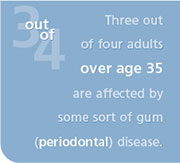 Proper oral care can keep you smiling well into retirement. Brushing at least twice a day with a fluoride toothpaste and a soft-bristle brush are important. Flossing helps save your teeth by removing plaque between teeth and below the gum line that your toothbrush can’t reach.
Proper oral care can keep you smiling well into retirement. Brushing at least twice a day with a fluoride toothpaste and a soft-bristle brush are important. Flossing helps save your teeth by removing plaque between teeth and below the gum line that your toothbrush can’t reach.
What problems should I watch for?
Gingivitis. Most people don’t realize how important it is to take care of their gums. Gingivitis is caused by the bacteria found in plaque that attacks the gums. Symptoms of gingivitis include red, swollen gums and possible bleeding when you brush. If you have any of these symptoms, see a dentist at once. Gingivitis can lead to a more serious form of gum disease if problems persist.
Why should I be concerned about gum disease?
Three out of four adults over age 35 are affected by some sort of gum (periodontal) disease. In gum disease, the infection may become severe. Your gums begin to recede, pulling back from the teeth. In the worst cases, bacteria form pockets between the teeth and gums, weakening the bone. This can lead to tooth loss if untreated, especially in patients with osteoporosis. If regular oral care is too difficult, your dentist can provide alternatives to aid in flossing and prescribe medication to keep the infection from getting worse.
 What if it’s too difficult to brush?
What if it’s too difficult to brush?
If you have arthritis, you may find it difficult to brush and floss. Ask your dentist for ways to overcome this problem. Certain dental products are designed to make dental care less painful for arthritis sufferers. Try using a battery operated toothbrush with a large handle. These toothbrushes can help by doing some of the work for you.
What are the signs of oral cancer?
Oral cancer most often occurs in people over 40 years of age. See a dentist immediately if you notice any red or white patches on your gums or tongue, sores that fail to heal within two weeks, or an unusual hard spot on the side of your tongue. Oral cancer is often difficult to detect in its early stages, when it can be cured easily. A dentist can perform a head and neck exam to screen for signs of cancer.
Should I be concerned about dry mouth?
Dry mouth happens when salivary glands fail to work due to disease, changes in medication, certain medications or cancer treatment. This makes it hard to eat, swallow, taste and speak. Drinking lots of water and avoiding sweets, tabacco, alcohol and caffeine are some ways to fight dry mouth.
How can I maintain my overall health?
Studies have shown maintaining a healthy mouth can keep your body healthier and help you avoid diabetes, heart disease and stroke. Keep your dentist informed of any changes or updates in your medical history to help prevent potentially harmful drug interactions or health conditions. The best way to achieve good oral health is to visit your dentist for a cleaning at least twice a year.
Download PDF version of “Seniors Oral Health Care”